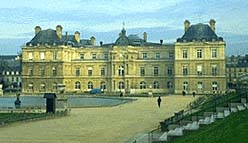|
|
|
|
|
|
|
|
|
|
|
|
|
|
|
|
|
|
|
|
|
|
|
|
|
|
History
|
|
|
| |
|
|
In the Luxembourg Gardens by John Singer Sargent Philadelphia Museum of Art BUY THIS PRINT |
| |
|
|
|
|
The Luxembourg Palace in Paris, the first great example of French classical architecture during the 17th century, was the culmination of the long tradition of the chateau as a building type. It was commissioned in 1615 by Marie de Médicis, regent of France, for a site on the Left Bank then occupied by the Hôtel du Luxembourg, from which the name was derived. The regent favored an Italianate structure modeled after Palazzo Pitti in her native Florence, but the architect Salomon de Brosse followed a typically French layout of wings surrounding a court, with the chief living quarters and chapel facing the garden. The west wing was the original site of the paintings (1622-25; Louvre, Paris) by Peter Paul Rubens depicting the regent's life.

|
Luxembourg Garden
A real Parisian favorite, the Jardin du Luxembourg is a magnificent, harmonious 25-hectare green oasis on Paris' fashionable Left Bank. The formal gardens are populated with many statues (including one of Sainte-Gèneviève, patron saint of Paris), fountains and beautiful flowers. In the southwest corner, there is an orchard where several hundred species of apple and pear trees blossom each spring. Children love the park, too, especially for its parc à jeux (playground) and the théâtre des marionettes (puppet theater); they can also rent boats and sail them in the glassy ponds. Sunday afternoon band concerts draw a crowd in the summer. The sprawling grounds are usually animated by lovers, students, chess aficionados, games of boules, and tennis players.
Nearby the Luxembourg Garden, the lively student area known as the Latin Quarter -- with the Sorbonne University and the Odéon Theater -- was the scene of the spectacular 1968 student riots which disrupted traditional French society.
Edited by Ian C. Mills, 1999.
Bibliography and recommended reading: Robert
Neuman, Instructor, School of Art and Art History, University of
Iowa, Iowa City -- Grolier Multimedia Encyclopedia v9.0.1.,
1997, Grolier Interactive Inc., Danbury, CT. Salomon de Brosse,
Rosalys Coope (1972). Paris From $70 A Day, Jeanne Oliver, 1998,
Macmillan Travel, A Simon & Schuster Macmillan Company, New York.
The Columbia Viking Desk Encyclopedia, Third
Edition, copyright Columbia University Press, 1968, Viking Press
Inc., New York (out-of-print). Pleasures of the Belle Epoque: Entertainment &
Festivity in Turn of the Century France, Charles Rearick,
1985, Yale University Press, printed by Murray Printing Co.,
Westford, Massachusetts. Paris.org (web site).
Paris Digest (web site).

|
||||||||||